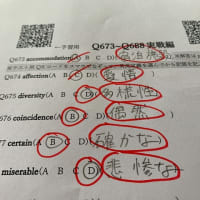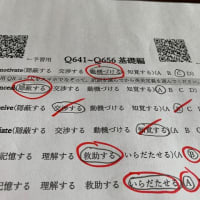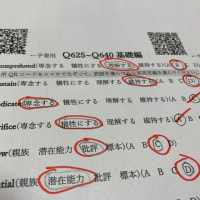著作権の切れた童話「ドリトル先生アフリカゆき」から、シンプルで、大学入試にもTOEICにも英検にも有効な練習問題を作成しています。楽しみながら英語力を伸ばしていただければ幸いです。( )には文脈にあったアルファベットを補充してください。スラッシュで区切られているのが四語整序問題になっています。
(3)
"Where did he put it?" asked the Doctor.
"Oh, he didn't put it anywhere—on me," said the horse. "He only tried to. I kicked him into the duck-pond."
"Well, well!" said the Doctor.
"I'm a pretty quiet creature as a ①( )ule," said the horse—"very ②( )atient with people—don't make much fuss. But it was bad enough to have that vet giving me the wrong ③( )( )dicine. And when that red-faced booby started to monkey with me, I just couldn't ④bea( ) it any more."
"Did you hurt the boy much?" asked the Doctor.
"Oh, no," said the horse. "I kicked him in the right place. The vet's ⑤( )ooking after him now. When will my glasses be ready?"
"I'll ⑥(for / have / you / them ) next week," said the Doctor. "Come in again Tuesday—Good morning!"
Then John Dolittle got a fine, big pair of green spectacles; and the plow-horse stopped going blind in one eye and could see as well as ever.
And soon it became a ⑦( )( )mmon sight to see farm-animals wearing glasses in the country round Puddleby; and a blind horse was a thing unknown.
And so it was with all the other animals that were brought to him. As soon as they found that he could talk their language, they told him where the pain was and how they felt, and of course it was easy for him to ⑧( )ure them.
Now all these animals went back and told their brothers and friends that there was a doctor in the little house with the big garden who really WAS a doctor. And whenever any ⑨( )reatures got sick—not only horses and cows and dogs—but all the little things of the fields, like harvest-mice and water-voles, badgers and bats, they came at once to his house on the edge of the town, so that his big garden was nearly always ⑩( )rowded with animals trying to get in to see him.
There were so many that came that he had to have special doors made for the different kinds. He wrote "HORSES" over the front door, "COWS" over the side door, and "SHEEP" on the kitchen door. Each kind of animal had a separate door—even the mice had a tiny tunnel ⑪(for / made / into / them ) the cellar, where they waited patiently in ⑫( )ows for the Doctor to come round to them.
And so, in a few years' time, every living thing for miles and miles got to know about John Dolittle, M.D. And the birds who flew to other countries in the winter told the animals in foreign lands of the wonderful doctor of Puddleby-on-the-Marsh, who could understand their talk and ⑬(their / help / in / them) troubles. In this way he became famous among the animals—all over the world—better known even than he had been among the ⑭( )olks of the West Country. And he was happy and liked his life very much.
One afternoon when the Doctor was busy writing in a book, Polynesia sat in the window—as she nearly always did—looking out at the leaves blowing about in the garden. Presently she laughed aloud.
"What is it, Polynesia?" asked the Doctor, looking up from his book.
"I was just thinking," said the parrot; and she went on looking at the leaves.
"What were you thinking?"
"I was thinking about people," said Polynesia. "People make me sick. They think they're so wonderful. The world has been going on now for thousands of years, hasn't it? And the only thing in animal-language that PEOPLE have learned to understand is that when a dog wags his tail he means 'I'm glad!'—It's funny, isn't it? You are the very first man to talk like us. Oh, sometimes people ⑮ann( )( ) me dreadfully—such airs they put on—talking about 'the dumb animals.' DUMB!—Huh! Why I knew a macaw once who could say 'Good morning!' in seven different ways without once opening his mouth. He could talk every language—and Greek. An old professor with a gray beard bought him. But he didn't stay. He said the old man didn't talk Greek right, and he couldn't stand listening to him teach the language wrong. I often ⑯( )onder what's become of him. That bird knew more geography than people will ever know.—PEOPLE, Golly! I ⑰suppo( )( ) if people ever learn to fly—like any common hedge-sparrow—we shall never hear the end of it!"
"You're a wise old bird," said the Doctor. "How old are you really? I know that parrots and elephants sometimes live to be very, very old."
"I can never be quite sure of my age," said Polynesia. "It's either a hundred and eighty-three or a hundred and eighty-two. But I know that when I first came here from Africa, King Charles was still hiding in the oak-tree—because I saw him. He looked ⑱( )cared to death."
THE THIRD CHAPTER
MORE MONEY TROUBLES
AND soon now the Doctor began to make money again; and his sister, Sarah, bought a new dress and was happy. Some of the animals who came to see him were so sick that they had to stay at the Doctor's house for a week. And when they were getting better they used to sit in chairs on the lawn.
And often even after they got well, they did not want to go away—they liked the Doctor and his house so much. And he never had the heart to ⑲( )efuse them when they asked if they could stay with him. So in this way ⑳(on / he / getting / went) more and more pets.
※(3)の解答①rule②patient③medicine④bear⑤looking⑥(have them for you)⑦common⑧cure⑨creatures⑩crowded⑪(made for them into)⑫rows⑬(help them in their)⑭folks⑮annoy⑯wonder ⑰suppose⑱scared to death ⑲refuse⑳(he went on getting)
(3)
"Where did he put it?" asked the Doctor.
"Oh, he didn't put it anywhere—on me," said the horse. "He only tried to. I kicked him into the duck-pond."
"Well, well!" said the Doctor.
"I'm a pretty quiet creature as a ①( )ule," said the horse—"very ②( )atient with people—don't make much fuss. But it was bad enough to have that vet giving me the wrong ③( )( )dicine. And when that red-faced booby started to monkey with me, I just couldn't ④bea( ) it any more."
"Did you hurt the boy much?" asked the Doctor.
"Oh, no," said the horse. "I kicked him in the right place. The vet's ⑤( )ooking after him now. When will my glasses be ready?"
"I'll ⑥(for / have / you / them ) next week," said the Doctor. "Come in again Tuesday—Good morning!"
Then John Dolittle got a fine, big pair of green spectacles; and the plow-horse stopped going blind in one eye and could see as well as ever.
And soon it became a ⑦( )( )mmon sight to see farm-animals wearing glasses in the country round Puddleby; and a blind horse was a thing unknown.
And so it was with all the other animals that were brought to him. As soon as they found that he could talk their language, they told him where the pain was and how they felt, and of course it was easy for him to ⑧( )ure them.
Now all these animals went back and told their brothers and friends that there was a doctor in the little house with the big garden who really WAS a doctor. And whenever any ⑨( )reatures got sick—not only horses and cows and dogs—but all the little things of the fields, like harvest-mice and water-voles, badgers and bats, they came at once to his house on the edge of the town, so that his big garden was nearly always ⑩( )rowded with animals trying to get in to see him.
There were so many that came that he had to have special doors made for the different kinds. He wrote "HORSES" over the front door, "COWS" over the side door, and "SHEEP" on the kitchen door. Each kind of animal had a separate door—even the mice had a tiny tunnel ⑪(for / made / into / them ) the cellar, where they waited patiently in ⑫( )ows for the Doctor to come round to them.
And so, in a few years' time, every living thing for miles and miles got to know about John Dolittle, M.D. And the birds who flew to other countries in the winter told the animals in foreign lands of the wonderful doctor of Puddleby-on-the-Marsh, who could understand their talk and ⑬(their / help / in / them) troubles. In this way he became famous among the animals—all over the world—better known even than he had been among the ⑭( )olks of the West Country. And he was happy and liked his life very much.
One afternoon when the Doctor was busy writing in a book, Polynesia sat in the window—as she nearly always did—looking out at the leaves blowing about in the garden. Presently she laughed aloud.
"What is it, Polynesia?" asked the Doctor, looking up from his book.
"I was just thinking," said the parrot; and she went on looking at the leaves.
"What were you thinking?"
"I was thinking about people," said Polynesia. "People make me sick. They think they're so wonderful. The world has been going on now for thousands of years, hasn't it? And the only thing in animal-language that PEOPLE have learned to understand is that when a dog wags his tail he means 'I'm glad!'—It's funny, isn't it? You are the very first man to talk like us. Oh, sometimes people ⑮ann( )( ) me dreadfully—such airs they put on—talking about 'the dumb animals.' DUMB!—Huh! Why I knew a macaw once who could say 'Good morning!' in seven different ways without once opening his mouth. He could talk every language—and Greek. An old professor with a gray beard bought him. But he didn't stay. He said the old man didn't talk Greek right, and he couldn't stand listening to him teach the language wrong. I often ⑯( )onder what's become of him. That bird knew more geography than people will ever know.—PEOPLE, Golly! I ⑰suppo( )( ) if people ever learn to fly—like any common hedge-sparrow—we shall never hear the end of it!"
"You're a wise old bird," said the Doctor. "How old are you really? I know that parrots and elephants sometimes live to be very, very old."
"I can never be quite sure of my age," said Polynesia. "It's either a hundred and eighty-three or a hundred and eighty-two. But I know that when I first came here from Africa, King Charles was still hiding in the oak-tree—because I saw him. He looked ⑱( )cared to death."
THE THIRD CHAPTER
MORE MONEY TROUBLES
AND soon now the Doctor began to make money again; and his sister, Sarah, bought a new dress and was happy. Some of the animals who came to see him were so sick that they had to stay at the Doctor's house for a week. And when they were getting better they used to sit in chairs on the lawn.
And often even after they got well, they did not want to go away—they liked the Doctor and his house so much. And he never had the heart to ⑲( )efuse them when they asked if they could stay with him. So in this way ⑳(on / he / getting / went) more and more pets.
※(3)の解答①rule②patient③medicine④bear⑤looking⑥(have them for you)⑦common⑧cure⑨creatures⑩crowded⑪(made for them into)⑫rows⑬(help them in their)⑭folks⑮annoy⑯wonder ⑰suppose⑱scared to death ⑲refuse⑳(he went on getting)






















※コメント投稿者のブログIDはブログ作成者のみに通知されます